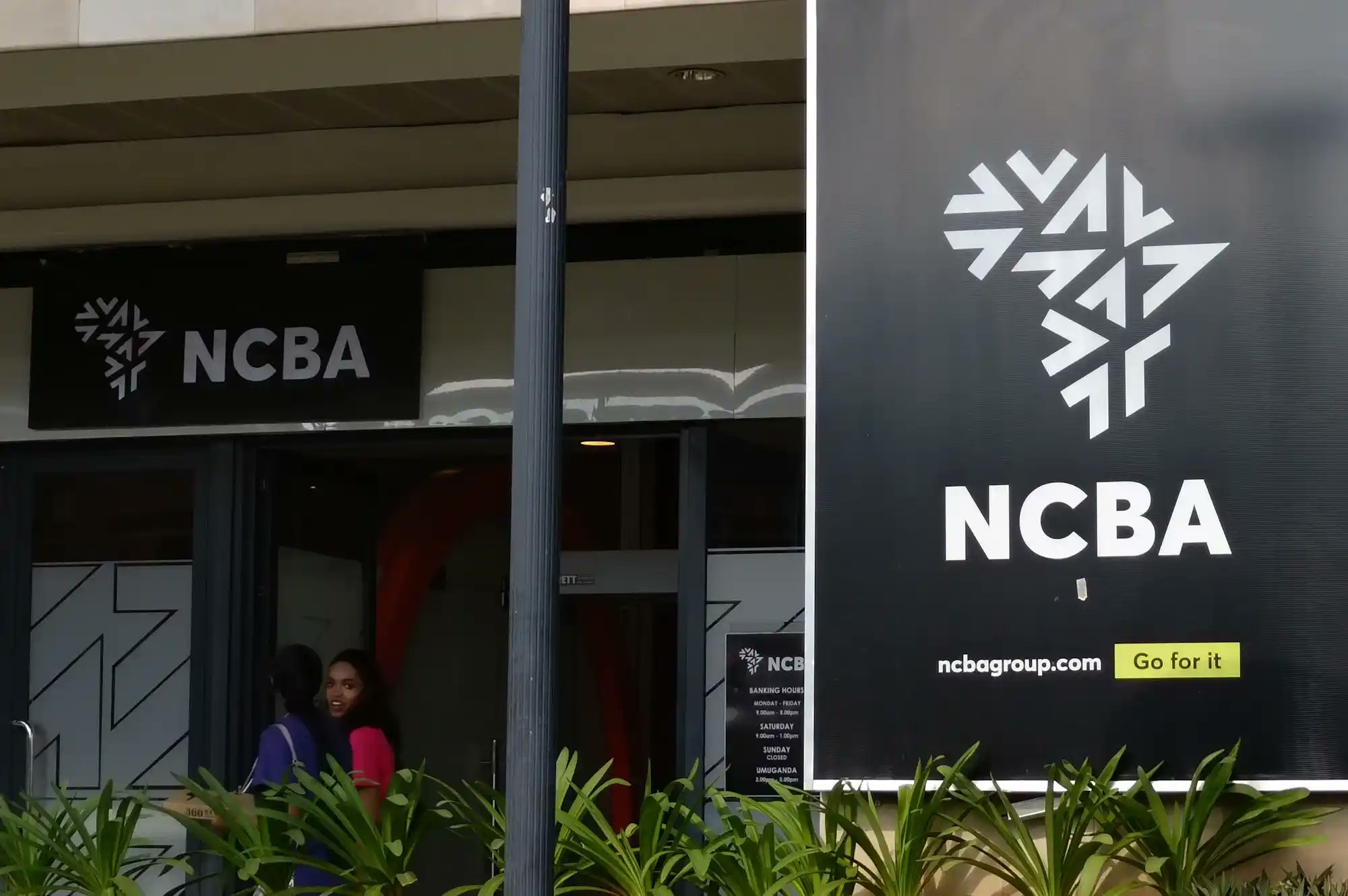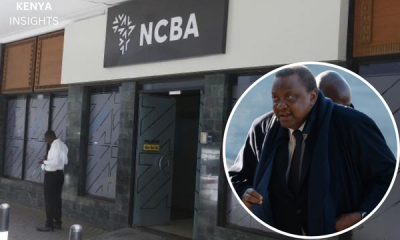Business
While Kenyans Looked Away, NCBA Shamelessly Tried to Dodge Its Tax Bill
This is not a struggling institution pleading poverty. This is a tier-one bank controlled by the Kenyatta family, holding 13.2 percent through Enke Investments, and the Ndegwa family, with 14.94 percent through First Chartered Securities.

There is something deeply offensive about watching a bank owned by Kenya’s wealthiest families fight tooth and nail to avoid paying taxes that ordinary Kenyans cannot escape.
While the rest of us dutifully watch stamp duty deductions chip away at every property transaction, every lease agreement, every financial instrument we touch, NCBA Group has spent months in court deploying expensive lawyers to argue why it should not pay Sh384.5 million in taxes that were illegally waived during a merger completed under the Uhuru Kenyatta administration.
The audacity is breathtaking.
This is not a struggling institution pleading poverty. This is a tier-one bank controlled by the Kenyatta family, holding 13.2 percent through Enke Investments, and the Ndegwa family, with 14.94 percent through First Chartered Securities.
Between them, these two families control more than a quarter of one of Kenya’s largest financial institutions. Yet here they are, through their corporate vehicle, claiming that being asked to follow the same tax laws as everyone else would cause “irreversible business consequences” and “great hardship.”
Let us be clear about what happened here.
In June 2019, as NIC Bank and CBA merged to create NCBA, the Treasury issued Legal Notice No.112 exempting the transaction from stamp duty.
This was not a small favor.
We are talking about Sh384.5 million, a sum that could build several health centers, equip dozens of schools, or provide clean water to thousands of rural households.
The waiver was granted during President Uhuru Kenyatta’s tenure, benefiting a bank in which his family holds substantial interest. The optics alone should have triggered alarm bells. The legality, as the courts have now confirmed, was always questionable.
Senator Okiya Omtatah, then an activist, saw what many chose to ignore and challenged the exemption in court.
In April 2025, more than two years after Uhuru Kenyatta left office, the High Court vindicated Omtatah’s petition, declaring the waiver unconstitutional.
Justice ruled that the exemption violated both the Stamp Duty Act and Article 201 of the Constitution, which demands that the burden of taxation be shared equitably.
In other words, even the elite must pay their fair share.
One would think that a bank claiming to uphold corporate governance and regulatory compliance would accept this judgment with grace, pay what it owes, and move on.
Instead, NCBA returned to court with a desperate application to freeze the order, arguing that immediate payment would destabilize its operations and harm depositors.
The bank’s lawyers painted apocalyptic scenarios: liquidity disruptions, shareholder value erosion, customers suffering as operational funds, including deposits, would need to be tapped to meet the tax obligation.
This is corporate melodrama at its finest. NCBA is not some fragile microfinance institution operating on razor-thin margins.
It is a banking behemoth that reported healthy profits even as it fought this case
The suggestion that paying Sh384.5 million, a sum it should have budgeted for in 2019 had the law been followed, would cripple its operations is an insult to public intelligence.
Banks manage billions in assets daily.
They stress-test for economic shocks, currency fluctuations, and regulatory changes.
Yet we are supposed to believe that following a court order to pay legitimately owed taxes represents an existential threat?
The bank’s argument that it acted “in good faith” when applying for the exemption is equally hollow.
Good faith does not absolve illegality.
If I evade taxes because I genuinely believed I was exempt, the Kenya Revenue Authority does not pat me on the back for my sincere confusion.
It demands payment, with interest and penalties.
Why should NCBA be treated differently?
The law is supposed to be blind to wealth and connection, though this case suggests it squints generously when billionaire families are involved.
NCBA’s lawyers also claimed that KRA lacks mechanisms to refund the money if the bank’s appeal succeeds, therefore the payment should be stayed.
The judge rightly dismissed this as incorrect, noting that KRA, as a public entity, is perfectly capable of issuing refunds.
But the argument reveals the entitled mindset at play here: the assumption that the burden of uncertainty should fall on the public purse rather than on the bank that benefited from an illegal waiver.
Ordinary taxpayers who overpay wait months, sometimes years, for KRA refunds without the luxury of court injunctions. NCBA expects special treatment.
What makes this fight particularly galling is the timing and the context.
Kenya is in the midst of a fiscal crisis. The government has been forced to implement unpopular tax measures, from the controversial Finance Acts to increased levies on basic goods, all justified by the need to shore up revenue and service mounting debt.
Citizens have taken to the streets in protest.
Young people, tired of being squeezed at every turn, have become a force of resistance against what they see as an extractive state that serves the wealthy while bleeding the poor.
Against this backdrop, watching a bank owned by dynasties that have accumulated wealth across generations fight to avoid paying taxes it never should have been exempted from is a masterclass in tone-deaf privilege.
It reinforces every cynical belief Kenyans hold about the tax system: that it is designed to trap the many while offering escape routes to the few, that connections matter more than compliance, that the law applies selectively based on who you know and how much power you wield.
The Treasury’s decision to grant the waiver in the first place raises serious questions that have not been adequately answered.
What public interest justified exempting this particular merger from stamp duty when countless other corporate transactions proceed without such favors?
The law allows for exemptions in specific circumstances, but they must be transparently justified and meet constitutional standards.
The court found that this exemption failed that test.
Yet nobody in the Treasury has faced consequences for issuing an illegal notice that cost the public hundreds of millions of shillings.
No investigation has been launched into whether proper procedure was followed or whether influence was improperly exerted.
The merger itself was presented as a strategic move to create a stronger banking entity capable of competing regionally.
Fine.
But why should Kenyan taxpayers subsidize the commercial ambitions of private shareholders? If the merger made business sense, it should have proceeded with or without the tax break.
The fact that NCBA now claims the waiver was “a central element in the financial structuring of the merger” suggests the transaction’s viability was built on the foundation of an illegal benefit. That is not sound corporate planning. That is opportunism dressed in business-speak.
The High Court’s refusal last week to freeze the judgment was legally sound and morally necessary.
As the judge noted, granting a stay would effectively revive an unconstitutional act, contradicting Article 2(4) of the Constitution, which voids illegal actions immediately.
Public interest cannot preserve laws already deemed invalid.
To allow NCBA to continue enjoying the benefits of an illegal exemption while it appeals would make a mockery of the judicial process and send a chilling message: that the powerful can ignore unfavorable rulings simply by filing appeals and claiming hardship.
NCBA’s case now moves to the Court of Appeal, where it will argue that the High Court misapplied principles of public interest and constitutional tax burden sharing.
Perhaps the appellate judges will see things differently.
But the bank should not hold its breath. The legal reasoning against it is solid, grounded in constitutional principles that courts have consistently upheld.
More importantly, the court of public opinion has already rendered its verdict.
Kenyans are tired of being told to tighten their belts while the elite loosen theirs.
This case is about more than Sh384.5 million.
It is about whether Kenya will enforce its laws equally or continue operating a two-tier system where the connected negotiate their obligations while the rest of us simply comply.
It is about whether our institutions have the spine to hold the powerful accountable or will perpetually find reasons to accommodate their convenience.
It is about whether we are serious about building a nation governed by law or content to maintain a façade of legality that crumbles whenever it inconveniences the right people.
NCBA should pay what it owes, apologize for wasting judicial time and public patience, and commit to exemplary corporate citizenship going forward. Its shareholders, among the wealthiest Kenyans alive, will not miss the money.
But the principle at stake, that everyone must contribute their fair share to the nation’s coffers, is one we cannot afford to compromise. Not now. Not ever.
The Writer is an analyst at a leading financial think-tank in the region.
Kenya Insights allows guest blogging, if you want to be published on Kenya’s most authoritative and accurate blog, have an expose, news TIPS, story angles, human interest stories, drop us an email on [email protected] or via Telegram
-

 Grapevine2 weeks ago
Grapevine2 weeks agoAlleged Male Lover Claims His Life Is in Danger, Leaks Screenshots and Private Videos Linking SportPesa CEO Ronald Karauri
-

 Grapevine1 week ago
Grapevine1 week agoRussian Man’s Secret Sex Recordings Ignite Fury as Questions Mount Over Consent and Easy Pick-Ups in Nairobi
-

 News4 days ago
News4 days agoTHE FIRM IN THE DOCK: How Kaplan and Stratton Became the Most Scrutinised Law Firm in Kenya
-

 Investigations6 days ago
Investigations6 days agoMulti-Million Dollar Fraud: Three Kenyans Face US Extradition in Massive Cybercrime Conspiracy
-

 Economy5 days ago
Economy5 days agoIran Demands Arrest, Prosecution Of Kenya’s Cup of Joe Director Director Over Sh2.6 Billion Tea Fraud
-

 Business6 days ago
Business6 days agoA Farm in Kenya’s Rift Valley Ignites a National Reckoning With Israeli Investment
-

 Africa1 week ago
Africa1 week agoFBI Investigates Congresswoman Ilhan Omar’s Husband’s Sh3.8 Billion Businesses in Kenya, Somalia and Dubai
-

 Business2 weeks ago
Business2 weeks agoM-Gas Pursues Carbon Credit Billions as Koko Networks Wreckage Exposes Market’s Dark Underbelly




















